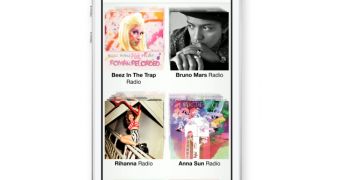Apple had a slew of announcements at its developer conference. So many, in fact, that some, which may have been huge news on any other day, passed almost unnoticed.
Alongside the clean and colorful new iOS, the new Mac OS X, the new MacBooks and Mac Pro, Apple also unveiled its long rumored online radio service.
Dubbed iTunes Radio, the new service won't go live until iOS7 hits devices this fall. But Apple has laid down most of the details.
It will be a fairly standard Internet radio service, much like Pandora or Slacker Radio. iTunes Radio will use your existing music preferences, based on the songs you already own for example, to generate a playlist you may like.
The service will be free, but ad-supported in the US. iTunes Match subscribers will get an ad-free version.
All fairly standard, but still an interesting service for Apple users, mostly due to its promised integration with iTunes, Siri, and so on.
What is interesting though is the difference between Apple's approach and Google's, who has been in a very similar situation.
Google, like Apple, wanted a music service that it could offer for its mobile platform. Having such a service both made Android (or iOS) more valuable in the eyes of the users and meant that Google (like Apple) could leverage its huge install base to quickly add subscribers.
But Google went for a full on-demand music streaming service, like Spotify or Deezer, while Apple opted for a curated and algorithm-driven Internet radio service.
Their choice may be purely coincidental, but it does highlight a major difference in perspective both between Apple and Google and between iOS and Android.
Google and Android are about choice, about giving users the power and the tools to do whatever they want and then leaving them to figure it out. With Google Play Music All Access, subscribers can listen to any song they can think of, out of the millions available, anytime they want. They just have to look for it.
Meanwhile, with iTunes Radio, users can choose a radio station or simply start playing music and then not have to worry about what comes next.
Apple's approach is that users want a guided experience, they don't want to have ask themselves what they should be listening to, create playlists, look for new artists, and so on. Rather, they just want to hit the play button and enjoy the music.
The benefit of this is that users don't have to spend too much time or energy on something that should be fun, like listening to music. The downside is that they can listen only to what Apple thinks they would like.
Apple has the same approach with everything it builds. It wants to create the best experience for users but believes it is the only one who can determine what that experience should be.
With Google's approach, the benefits and downsides are reversed. In the end, no one can say that one approach is better than the other. Sometimes people just want to listen to some fun music, other times they know exactly what they want to listen to.

 14 DAY TRIAL //
14 DAY TRIAL //